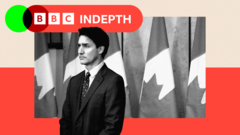Canada, once a bastion of acceptance, is now seeing a shift in public opinion regarding immigration, exacerbated by soaring housing costs. This transformation played a crucial role in Justin Trudeau's recent resignation amid growing concerns about how the nation can handle an influx of newcomers.
Immigration Crisis Fuels Unrest: Canada Faces New Challenges Ahead

Immigration Crisis Fuels Unrest: Canada Faces New Challenges Ahead
Rising rents and housing shortages are reshaping Canadian attitudes toward immigration, contributing to political upheaval and widespread discontent.
In Brampton, Ontario, a rental listing for a small bathroom converted into a bedroom illustrates the dire housing crisis unfolding in Canada. Asking for only C$550 a month in a region where average rents exceed C$2,261, the ad has spurred outrage and highlighted the lengths some residents are forced to go in search of affordable accommodation. Such listings have proliferated in a housing market that has witnessed rent increases of nearly 20% in the past three years, leaving many Canadian families in unsuitable living conditions.
The surge in population, largely driven by immigration, has left many Canadians grappling with how to manage these changes. A December report revealed over 2.4 million families are living in homes that are overcrowded, in need of repairs, or unaffordable, prompting an unprecedented shift in sentiments toward newcomers. This change is underscored by a 2022 survey that indicated only 27% of Canadians felt too many immigrants were entering the country; by 2024, that number skyrocketed to 58%.
Political movements against immigration have started to gain traction across the nation, with protests emerging in major cities including Ottawa, Vancouver, and Calgary. Citizens, like Peter Kratzar, founder of Cost of Living Canada, argue that issues related to housing and living expenses are directly tied to immigration policy, a sentiment echoed by many frustrated voters.
Trudeau's resignation in January 2024, citing internal challenges and a significant drop in approval ratings, is a signal of the growing discontent on the issue. During his tenure, Canada's immigrant population surged, 90% of which contributed to recent population growth. While immigration was not the sole reason for his departure, rising public anxiety surrounding housing and cost of living reflects a disconnect between government strategies and constituent needs.
As the elections draw closer, potential successors from the Liberal Party face a changing landscape where the Conservative Party, advocating for tighter immigration controls, currently leads in polls. This repositioning signals a notable shift as Canada's political narrative increasingly mirrors sentiments seen in other western nations regarding immigration.
The reopening of borders and tightening of asylum-seeker regulations between Canada and the U.S. amid Trump’s presidency exacerbates these tensions. Many speculate that Trump's policies will amplify anti-immigrant feelings across Canada, potentially reshaping the political playing field.
While Canada has long prided itself on multiculturalism, current trends suggest a growing discomfort with its immigration policies, prompting citizens to question how newcomers fit into the nation's future. Despite differing views on this contentious issue, some leaders express optimism about maintaining a welcoming stance, emphasizing the vital contributions of immigrants to Canadian society.
As government officials grapple with policies aiming to balance population growth and infrastructure, many Canadians remain hopeful for a more equitable future amidst these evolving challenges. The reflections on affordability and immigration underscore the continuing complexity of navigating modern Canadian identity within the context of housing and economic strife.
The surge in population, largely driven by immigration, has left many Canadians grappling with how to manage these changes. A December report revealed over 2.4 million families are living in homes that are overcrowded, in need of repairs, or unaffordable, prompting an unprecedented shift in sentiments toward newcomers. This change is underscored by a 2022 survey that indicated only 27% of Canadians felt too many immigrants were entering the country; by 2024, that number skyrocketed to 58%.
Political movements against immigration have started to gain traction across the nation, with protests emerging in major cities including Ottawa, Vancouver, and Calgary. Citizens, like Peter Kratzar, founder of Cost of Living Canada, argue that issues related to housing and living expenses are directly tied to immigration policy, a sentiment echoed by many frustrated voters.
Trudeau's resignation in January 2024, citing internal challenges and a significant drop in approval ratings, is a signal of the growing discontent on the issue. During his tenure, Canada's immigrant population surged, 90% of which contributed to recent population growth. While immigration was not the sole reason for his departure, rising public anxiety surrounding housing and cost of living reflects a disconnect between government strategies and constituent needs.
As the elections draw closer, potential successors from the Liberal Party face a changing landscape where the Conservative Party, advocating for tighter immigration controls, currently leads in polls. This repositioning signals a notable shift as Canada's political narrative increasingly mirrors sentiments seen in other western nations regarding immigration.
The reopening of borders and tightening of asylum-seeker regulations between Canada and the U.S. amid Trump’s presidency exacerbates these tensions. Many speculate that Trump's policies will amplify anti-immigrant feelings across Canada, potentially reshaping the political playing field.
While Canada has long prided itself on multiculturalism, current trends suggest a growing discomfort with its immigration policies, prompting citizens to question how newcomers fit into the nation's future. Despite differing views on this contentious issue, some leaders express optimism about maintaining a welcoming stance, emphasizing the vital contributions of immigrants to Canadian society.
As government officials grapple with policies aiming to balance population growth and infrastructure, many Canadians remain hopeful for a more equitable future amidst these evolving challenges. The reflections on affordability and immigration underscore the continuing complexity of navigating modern Canadian identity within the context of housing and economic strife.



















